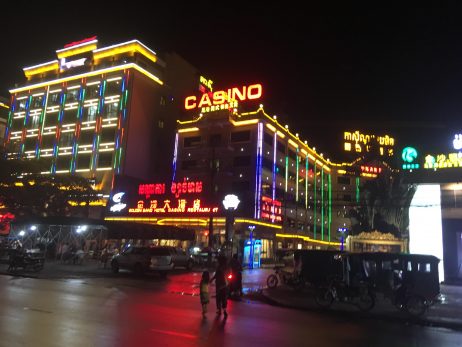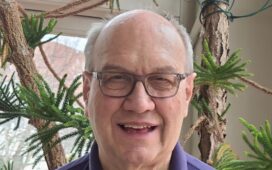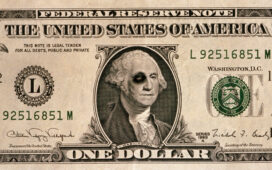Cambodia has become a money-laundering haven for Chinese criminals for several very basic reasons, according to an analyst who works on criminal justice.
In a note posted on LinkedIn on Monday, Mina Chiang said she had briefed an Interpol meeting in Tokyo on features of Cambodia’s legal and financial system to explain why Chinese citizens see it as an extraordinarily “convenient” hub to exchange money.
Cambodia is not part of the Common Reporting System – a global framework developed by the Organization for Economic Cooperation and Development (OECD) to facilitate the exchange of financial account information about citizens’ assets with other participating governments, Ms Chiang said.
ALSO SEE: SE Asia Crime Networks Rely on Telegram, Crypto, UN Says
The goal of the CRS, she said, “is to jointly combat tax evasion, money laundering, and other activities that exploit the lack of transparency in cross-border information.”
Individuals’ personal assets and tax status would be exposed and create financial transparency if Cambodia belonged to the CRS, she said, because “it covers all financial account information that taxpayers hold overseas, such as stocks, funds, futures, bonds, insurance, equity, etc.”
“Cambodia is one of the rare non-CRS countries in the world, and therefore it attracts individuals who want to hide their assets,” she said.
“Once funds are transferred to a non-CRS country, they become difficult to trace and, as a result, are not subject to tax collection by the original country, and also convenient for money laundering purposes.
“As early as 2017, Chinese social media has been promoting Cambodia passports, to avoid the CRS standards.”
Few limits on forex deals, visas
Judging by her remarks, the Cambodian government has made a number of other moves that appear to have questionable objectives.
“Countries with weak and/or developing economies generally use foreign exchange controls to limit speculation against their currencies, including China. However, Cambodia puts no restrictions or limitations on the exchange of foreign currencies,” she said.
“What’s even more convenient is that, despite having its national currency, Cambodia is also using the US dollar. Almost all transactions can be conducted in USD. At most banks, in practice, individuals do not need to make an appointment to withdraw over a $1 million in cash on the spot (assuming there is enough money in the bank account) – [they] just need to provide any reason/excuse.”
A further reason was because Cambodia implements a visa-on-arrival policy for Chinese citizens, and there is almost zero rejection rate, she said.
“With either visa-on-arrival or multi-entry business visas, foreigners can walk into banks and open local Cambodian bank accounts. Within half an hour, the bank account would be ready; within one week, the bank card would be ready,” she said.
Many forex outlets run by Chinese
Aside from banks, local currency exchange outlets also play a major role in enabling money laundering in Cambodia, Chiang said.
“Cambodia has hundreds of legal currency exchange companies (a currency exchange licence costs $20,000, so you can also start one if you have the money), including Huione, she said.
“The staff at these exchange shops assist individuals in installing their app and opening an account, a process similar to opening a bank account, but without the need to provide identification — only a Cambodian phone number is required.
“Once the account is opened, individuals go to the deposit counter, where the staff provide their company’s Chinese bank account details. Customers can then transfer RMB from their Chinese domestic bank account to the exchange store’s Chinese domestic account, and the exchange store staff will convert the funds into USD based on the current exchange rate and either deposit it into the individual’s Huione account or provide the option to withdraw the USD in cash directly.
“By the way, almost all currency exchange companies are run by Chinese nationals and conduct business in Mandarin,” she said.
There are many articles on Chinese social media teaching Chinese people how to transfer their assets between Cambodia and China, and how to conduct money laundering, she said, giving the following example.
One article says: “For Cambodia’s local currency exchange companies, handling $5 million in cash in a single day is considered routine. If an individual has 1 billion RMB [yuan] to exchange into USD, they can work with five different exchange companies, make appointments in advance, and complete the entire deposit into Cambodian banks within three days.
“Depositing or withdrawing several million USD in one go is not a problem. The only issue is whether your suitcase is large enough. A 22-inch suitcase can only hold $2.4 million at a time, which is definitely not enough for your needs.”
And she lists other countries that have failed to sign up to the CRS – Myanmar, Laos, Sri Lanka, Armenia and Palau – and notes that “Yes, Chinese-operated scamming operations are starting to be found in countries like Armenia, Georgia, and Palau.”
Footnote: Cambodia recently arrested Mech Dara, an award-winning freelance writer who frequently reported on cyber-scam compounds. A Cambodian court said last Tuesday that Dara had been jailed pending trial after being charged with inciting social chaos over social media posts it called “fake news”.
ALSO SEE:
Weak ASEAN Nations ‘at Risk of Evolving Into Scamming States’
‘US to Sanction Prominent Cambodians Tied to Scam Centres’
N Korean Hackers Used Cambodian Firm to Launder Stolen Crypto
Scamming Compounds in SE Asia Stole $64 Billion in 2023: Report
High-Tech Asian Crime Wave: Cyber Scams, Casinos Loot Billions
Big Tech ‘Doing Little’ to Counter Rampant Scams on Social Media
Macau Junket King Alvin Chau Gets 18 Years For Casino Crimes
Crime Gangs Control Some Myanmar, Laos Economic Zones: UN





